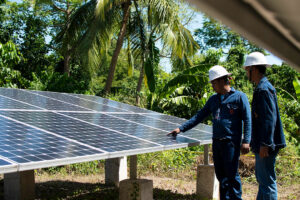‘Green’ startups angling for tie-ups with major companies
PHILIPPINE ENERGY and climate-mitigation startups have grown since 2020, but will need the clout of major companies working in partnership to ensure access to financing, California-based business accelerator New Energy Nexus (NEX) said. “Local entrepreneurs are best placed to understand how to deploy solutions in their communities and transition our economy more equitably to clean […]

PHILIPPINE ENERGY and climate-mitigation startups have grown since 2020, but will need the clout of major companies working in partnership to ensure access to financing, California-based business accelerator New Energy Nexus (NEX) said.
“Local entrepreneurs are best placed to understand how to deploy solutions in their communities and transition our economy more equitably to clean energy. It really does take a village to build and deploy these solutions,” NEX Philippines Country Director Brenda Valerio said in a media roundtable on Wednesday.
In a report, NEX tallied 91 clean-energy and climate startups in 2024, up 500% since 2020. Of these, NEX supports 85.
Nearly half of these startups are in the renewable energy generation industry, while others are involved in sustainable transportation or electro mobility, energy access, and waste management.
The report noted that while 34.1% of the startups are in Metro Manila, entrepreneurs from Northern Mindanao and Calabarzon are making inroads.
“We still have many energy issues. But at the same time, we can leverage entrepreneurs and innovators to address them,” Ms. Valerio said.
The report said that 18 startup companies have raised almost $1.3 million from loans, grants, competition rewards, crowdfunding, and angel investment.
Ms. Valerio said these kinds of energy startups need backing from major corporations to ensure financing.
“The Filipino clean energy innovation ecosystem has shown huge progress and promise in the past years, but the nascent space runs the risk of stalling because of lack of access to networks, funding, testing facilities, and skills training,” Ms. Valerio said.
The report recommended experimenting with “diverse funding mechanisms and de-risking strategies to create a more investor-friendly environment for both institutions and innovators.”
“This decade is the most critical decade in our transition, not just with trying to limit our greenhouse gas emissions so we can achieve the 1.5 degree of the UNFCCC (United Nations Framework Convention on Climate Change),” Ms. Valerio said.
The government is hoping to accelerate its energy transition, with a goal of increasing the share of renewable energy in the power mix to 35% by 2030 and 50% by 2040. — Sheldeen Joy Talavera













